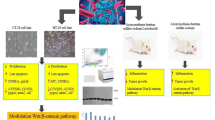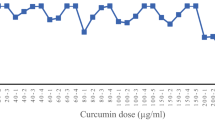Abstract
Background
Colorectal cancer is one of the widespread and lethal types of malignancies. Recently, antineoplastic attributes of probiotics have attracted lots of attention. Here, we investigated anti-proliferative potential of the non-pathogenic strains Lactobacillus plantarum ATCC 14,917 and Lactobacillus rhamnosus ATCC 7469 on human colorectal adenocarcinoma-originated Caco-2 cells.
Methods and results
Caco-2 and HUVEC control cells were treated with ethyl acetate extracts of the two Lactobacillus strains to assess cell viability by MTT assay. Annexin/PI staining flow cytometry, and caspase-3, -8 and − 9 activity assays were performed to determine the type of cell death induced in extract-treated cells. Expression levels of apoptosis-related genes were evaluated by RT-PCR. Extracts from both L. plantarum and L. rhamnosus specifically targeted the Caco-2 cells and not HUVEC controls, and significantly affected the viability of the colon cancer cell line in a time- and dose-dependent manner. This effect was shown to occur through activation of the intrinsic apoptosis pathway, as indicated by the increased caspase-3 and − 9 activities. While there are limited and conflicting data about the mechanisms underlying the specific antineoplastic attributes of Lactobacillus strains, we clarified the overall induced mechanism. The Lactobacillus extracts specifically down-regulated the expression of the anti-apoptotic bcl-2 and bcl-xl, and simultaneously up-regulated the pro-apoptotic bak, bad, and bax genes in treated Caco-2 cells.
Conclusions
Ethyl acetate extracts of L. plantarum and L. rhamnosus strains could be considered as targeted anti-cancer treatments specifically inducing the intrinsic apoptosis pathway in colorectal tumor cells.





Similar content being viewed by others
Abbreviations
- Bcl-2::
-
B-cell lymphoma 2
- Bcl-xL::
-
B-cell lymphoma-extra, long isoform
- BAD::
-
Bcl-2 associated agonist of cell death
- BAK::
-
Bcl-2 homologous antagonist killer
- BAX::
-
Bcl-2-associated X protein
- DMEM::
-
Dulbecco’s Modified Eagle medium
- EPS::
-
Crude exopolysaccharide
- IECs::
-
Intestinal epithelial cells
- L. plantarum::
-
Lactobacillus plantarum
- L. rhamnosus::
-
Lactobacillus rhamnosus
- LGG::
-
L. rhamnosus GG CGMCC 1.2134
- MRS::
-
De Man, Rogosa and Sharp
- MTT::
-
3-[4,5-dimethylthiazol-2-yl]-2,5-diphenyl tetrazolium bromide
- PI::
-
Propidium Iodide
- pNA::
-
p-nitroaniline
References
Wong SH et al (2019) Clinical applications of gut microbiota in cancer biology. Seminars in cancer biology. Elsevier
Ali A, Tan H, Kaiko GE (2020) Role of the intestinal epithelium and its interaction with the microbiota in food allergy. Frontiers in Immunology, p. 3222
Andrews C, McLean MH, Durum SK (2018) Cytokine tuning of intestinal epithelial function. Front Immunol 9:1270
Kirjavainen PV, et al (1999) The effect of orally administered viable probiotic and dairy lactobacilli on mouse lymphocyte proliferation. FEMS Immun Medical Microbio 26(2):131–135
Gill HS et al (2000) Enhancement of natural and acquired immunity by Lactobacillus rhamnosus (HN001), Lactobacillus acidophilus (HN017) and Bifidobacterium lactis (HN019). Br J Nutr 83(2):167–176
Pessi T et al (2000) Interleukin-10 generation in atopic children following oral Lactobacillus rhamnosus GG. & Experimental Allergy 30(12):1804–1808Clinical
Larsson A et al (2012) Validation of podocalyxin-like protein as a biomarker of poor prognosis in colorectal cancer. BMC Cancer 12(1):1–9
Górska A et al (2019) Probiotic bacteria: a promising tool in cancer prevention and therapy. Curr Microbiol 76:939–949
Samanta S (2022) Potential impacts of prebiotics and probiotics on cancer prevention. Anti-Cancer Agents in Medicinal Chemistry (Formerly Current Medicinal Chemistry-Anti-Cancer Agents). 22:605–6284
Artis D (2008) Epithelial-cell recognition of commensal bacteria and maintenance of immune homeostasis in the gut. Nat Rev Immunol 8(6):411–420
Uhlig HH et al (2006) Differential activity of IL-12 and IL-23 in mucosal and systemic innate immune pathology. Immunity 25(2):309–318
O’Neil DA et al (1999) Expression and regulation of the human β-defensins hBD-1 and hBD-2 in intestinal epithelium. J Immunol 163(12):6718–6724
Nami Y et al (2014) Assessment of probiotic potential and anticancer activity of newly isolated vaginal bacterium Lactobacillus plantarum 5BL. Microbiol Immunol 58(9):492–502
Chondrou P et al (2018) Lactobacillus paracasei K5 displays adhesion, anti-proliferative activity and apoptotic effects in human colon cancer cells. Beneficial Microbes 9(6):975–983
Orlando A et al (2012) Antiproliferative and proapoptotic effects of viable or heat-killed Lactobacillus paracasei IMPC2. 1 and Lactobacillus rhamnosus GG in HGC-27 gastric and DLD-1 colon cell lines. Nutr Cancer 64(7):1103–1111
Scharlau D et al (2009) Mechanisms of primary cancer prevention by butyrate and other products formed during gut flora-mediated fermentation of dietary fibre. Mutat Research/Reviews Mutat Res 682(1):39–53
Tiptiri-Kourpeti A et al (2016) Lactobacillus casei exerts anti-proliferative effects accompanied by apoptotic cell death and up-regulation of TRAIL in colon carcinoma cells. PLoS ONE 11(2):e0147960
Szajewska H et al (2001) Efficacy of Lactobacillus GG in prevention of nosocomial diarrhea in infants. J Pediatr 138(3):361–365
Goldenberg JZ et al (2017) Probiotics for the prevention of Clostridium difficile-associated diarrhea in adults and children. Cochrane Database of Systematic Reviews (12)
Kalliomäki M et al (2001) Probiotics in primary prevention of atopic disease: a randomised placebo-controlled trial. The Lancet 357(9262):1076–1079
Marteau PR et al (2001) Protection from gastrointestinal diseases with the use of probiotics. Am J Clin Nutr 73(2):430s–436s
Nowak A, Paliwoda A, Błasiak J (2019) Anti-proliferative, pro-apoptotic and anti-oxidative activity of Lactobacillus and Bifidobacterium strains: a review of mechanisms and therapeutic perspectives. Crit Rev Food Sci Nutr 59(21):3456–3467
Mosmann T (1983) Rapid colorimetric assay for cellular growth and survival: application to proliferation and cytotoxicity assays. J Immunol Methods 65(1–2):55–63
Vermes I et al (1995) A novel assay for apoptosis flow cytometric detection of phosphatidylserine expression on early apoptotic cells using fluorescein labelled annexin V. J Immunol Methods 184(1):39–51
Peterson GL (1977) A simplification of the protein assay method of Lowry et al. which is more generally applicable. Anal Biochem 83(2):346–356
Voulgaridou G-P et al (2020) Aldehyde dehydrogenase 3A1 confers oxidative stress resistance accompanied by altered DNA damage response in human corneal epithelial cells. Free Radic Biol Med 150:66–74
Mahomoodally MF et al (2019) Multi-targeted potential of Pittosporum senacia Putt.: HPLC-ESI-MSn analysis, in silico docking, DNA protection, antimicrobial, enzyme inhibition, anti-cancer and apoptotic activity. Comput Biol Chem 83:107114
Ye S et al (2020) Sesamin promotes angiogenesis and accelerates wound healing in rats via alleviates TBHP-induced apoptosis in human umbilical vein endothelial cells. Biosci Biotechnol Biochem 84(5):887–897
Dico AL et al (2019) Role of metformin and AKT Axis modulation in the reversion of hypoxia induced TMZ-resistance in glioma cells. Frontiers Oncol 9
Uzoh C et al (2011) Insulin-like growth factor-binding protein-2 promotes prostate cancer cell growth via IGF-dependent or-independent mechanisms and reduces the efficacy of docetaxel. Br J Cancer 104(10):1587–1593
Natoli M et al (2012) Good Caco-2 cell culture practices. Toxicol In Vitro 26(8):1243–1246
Sadeghi-Aliabadi H et al (2014) Effects of Lactobacillus plantarum A7 with probiotic potential on colon cancer and normal cells proliferation in comparison with a commercial strain. Iran J Basic Med Sci 17(10):815
Hu J et al (2015) Anti-tumour immune effect of oral administration of Lactobacillus plantarum to CT26 tumour-bearing mice. J Biosci 40:269–279
Yue Y et al (2020) Probiotic strain Lactobacillus plantarum YYC-3 prevents colon cancer in mice by regulating the tumour microenvironment. Biomed Pharmacother 127:110159
Gamallat Y et al (2016) Lactobacillus rhamnosus induced epithelial cell apoptosis, ameliorates inflammation and prevents colon cancer development in an animal model, vol 83. Biomedicine & Pharmacotherapy, pp 536–541
Rajoka MSR et al (2018) Anticancer potential against cervix cancer (HeLa) cell line of probiotic Lactobacillus casei and Lactobacillus paracasei strains isolated from human breast milk. Food & function. 9(5):2705–2715
Nami Y et al (2014) Probiotic potential and biotherapeutic effects of newly isolated vaginal Lactobacillus acidophilus 36YL strain on cancer cells. Anaerobe 28:29–36
Pfeffer CM, Singh AT (2018) Apoptosis: a target for anticancer therapy. Int J Mol Sci 19(2):448
Altonsy MO, Andrews SC, Tuohy KM (2010) Differential induction of apoptosis in human colonic carcinoma cells (Caco-2) by Atopobium, and commensal, probiotic and enteropathogenic bacteria: mediation by the mitochondrial pathway. Int J Food Microbiol 137(2–3):190–203
Sun M et al (2021) The effects of Lactobacillus plantarum-12 crude exopolysaccharides on the cell proliferation and apoptosis of human colon cancer (HT-29) cells. Probiotics and Antimicrobial Proteins 13(2):413–421
Ugarte-Uribe B, García-Sáez AJ (2017) Apoptotic foci at mitochondria: in and around bax pores. Philosophical Trans Royal Soc B: Biol Sci 372(1726):20160217
Wang C, Youle RJ (2009) The role of mitochondria in apoptosis. Annu Rev Genet 43:95
Kerr JF, Winterford CM, Harmon BV (1994) Apoptosis Its significance in cancer and cancer therapy Cancer 73(8):2013–2026
Martinou J-C, Youle RJ (2011) Mitochondria in apoptosis: Bcl-2 family members and mitochondrial dynamics. Dev Cell 21(1):92–101
Budu O et al (2022) A combination of two probiotics, Lactobacillus sporogenes and Clostridium butyricum, inhibits Colon Cancer Development: an in Vitro Study. Microorganisms 10(9):1692
Funding
The authors did not receive support from any organization for the submitted work. No funding was received to assist with the preparation of this manuscript. No funding was received for conducting this study. No funds, grants, or other support was received.
Author information
Authors and Affiliations
Contributions
In this research, Mansour Amin, Tahereh Navidifar, Sholeh Saeb, Ebrahim Barzegari, and Mostafa Jamalan have been in charge of research, data collection and analysis, and article writing.
Corresponding author
Ethics declarations
Conflicts of interest/Competing interests
All authors certify that they have no affiliations with or involvement in any organization or entity with any financial or non-financial interest in the subject matter or materials discussed in this manuscript.
Ethics approval
This research project was approved by the Ethics Committee of Ahvaz Jundishapur University of Medical Sciences, Ahvaz, Iran.
Consent to participate
For all research involving in human subjects in current study, freely-given, informed consent to participate in the study from participants was gained and the statement to this effect is appear in the manuscript.
Consent for publication
The authors affirm that human research participants clearly provided informed about consent for publication.
Additional information
Publisher’s Note
Springer Nature remains neutral with regard to jurisdictional claims in published maps and institutional affiliations.
Rights and permissions
Springer Nature or its licensor (e.g. a society or other partner) holds exclusive rights to this article under a publishing agreement with the author(s) or other rightsholder(s); author self-archiving of the accepted manuscript version of this article is solely governed by the terms of such publishing agreement and applicable law.
About this article
Cite this article
Amin, M., Navidifar, T., Saeb, S. et al. Tumor-targeted induction of intrinsic apoptosis in colon cancer cells by Lactobacillus plantarum and Lactobacillus rhamnosus strains. Mol Biol Rep 50, 5345–5354 (2023). https://doi.org/10.1007/s11033-023-08445-x
Received:
Accepted:
Published:
Issue Date:
DOI: https://doi.org/10.1007/s11033-023-08445-x




